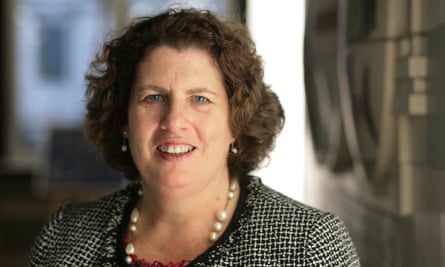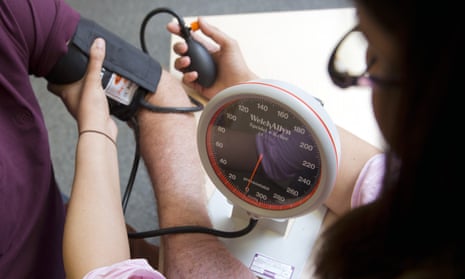Britain’s GPs are so tired and overloaded that they are at risk of harming patients’ health by misdiagnosing illness or giving them the wrong drugs, the head of the profession has warned.
In a stark description of the potential consequences to patients’ safety of “GP fatigue”, Dr Maureen Baker says that “persistent and excessive workload” faced by family doctors puts them at the same risk of inadvertently causing harm or even death as overtired pilots or lorry drivers.
In a paper for the Royal College of GPs (RCGP), which she chairs, Baker, an acknowledged expert in patient safety, demands urgent action to prevent “devastating” impact on care.
NHS England and the Department of Health in England, while recognising pressures on GPs, chose to stress the thousands of extra staff promised in primary care by 2020, rather than to tackle head-on Baker’s warnings on more immediate risks to patients.
Baker’s paper says: “GPs will always work in the best interests of their patients – even when they are putting their own health at risk – but, ironically, this can actually have an adverse effect on patient safety.
“Few of us would voluntarily board a plane flown by a visibly tired pilot or get on a train where we knew the driver had spent too much time at the controls – yet there are no methods or systems for addressing doctor and staff fatigue in general practice.
“Even in other areas of the NHS, ‘distress signals’ – such as red and black alerts in hospitals – exist so that other clinicians can simply declare that they cannot take on further work safely.
“But unless we disrupt patient services – which is the last thing that GPs want to do – we currently have no strategies in place to prevent and reduce the risk of patient harm that might arise from having tired, overworked doctors and practice staff.”

Baker, who is the strategic safety adviser for patient safety at the Health and Social Care Information Centre, said her intention was not to panic patients but “to send out a pre-emptive strike to ensure that we take steps now to protect patients from the risks arising from doctor and staff fatigue”.
She sets out five ways in which patients could come to harm from GPs under such strain that their concentration suffers. They are: missing or delaying the diagnosis of a patient’s illness, which then worsens, or over-diagnosing someone who then receives treatment they do not need; mistaking one patient for another; giving a patient the wrong medication; immunising someone with the wrong vaccination; or failing to issue a patient a repeat prescription, monitor their condition properly or investigate emerging evidence about their illness thoroughly enough.
Her fears represent a dramatic escalation of concerns about the ability of NHS general practice services to cope with relentlessly growing demand, which has been fuelled by a growing and ageing population and a rise in the number of people with long-term conditions such as diabetes, depression and dementia.
The RCGP discussion paper, entitled “Patient safety implications of general practice workload”, says there was a 19% rise in GP consultations in England between 2008/09 and 2013/14. At the same time, the number of family doctors across the UK grew by just 4.1%.
Surgeries’ efforts to respond are being hampered by a recruitment crisis that means young doctors are increasingly shunning the profession at the same time that more and more experienced GPs are retiring early, often because they have had enough of the growing pressures they face.
Baker said the current GP workforce in England is approximately 3,300 too small, with this shortfall projected to grow to 8,000 by 2020.
Among her recommendations to relieve the strain on GPs and staff of the UK’s 10,000 surgeries are to limit the number of hours worked and patients seen by clinical staff, while acknowledging that these could lead to delays in diagnosis and treatment. Closing the surgery when clinics are running late would risk even those with urgent problems experiencing delays, with “clear safety implications”, the report says.
Staff who work through their break to catch up with work tasks, as many GPs do, are at risk of becoming hungry, angry, late or tired – all telltale signs that an employee in a safety-critical industry is more likely to make a mistake, the paper says. It suggests all practices should insist that GPs and other practice staff, who it emphasises are also feeling the strain, have mandatory breaks of 10-15 minutes.
A spokesperson for the Department of Health said: “GPs do a fantastic job and we know they are under pressure as our population ages and more people live with long-term conditions. That’s why we have committed to make 10,000 more staff available for general practice by 2020, including 5,000 more GPs. There’s also lots of work being done to cut unnecessary paperwork.
“However, real support for GPs will come through changing the way the NHS works to focus on prevention not cure, which we are doing by backing NHS England’s five-year plan. This will ease the pressures GPs face and create a better service for patients.”
NHS England insisted it was “working hard with our partners, including the RCGP, on a range of initiatives to increase GP numbers, reduce bureaucracy and use the skills of other health care professionals, such as community pharmacists, to ensure high-quality, and, above all else, safe, patient care”.

Comments (…)
Sign in or create your Guardian account to join the discussion